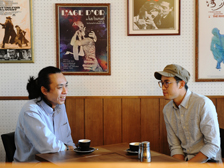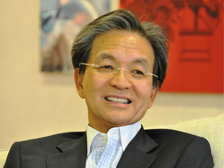
Break-up backup:
The fund helped Barbara Wong complete her breakthrough film Break Up Club in 2009.

Directors debut:
Jimmy Wan and Derek Tsang are appreciative of the fund for providing opportunities for new talent, and supporting medium-budget productions.

Open door:
Film Development Fund Chairman Jack So encourages new directors and producers to put forward fresh, creative ideas.
Fund propels local film development
December 18, 2011
Renowned documentary director Barbara Wong decided to change tack in 2009, and create a new-style movie. An investor from Singapore was keen to fund it, so she got the script together for
Break Up Club - a romantic comedy that revolves around a website that allows people to win back lost partners, if they will split up another happy couple.
“When I finally finished the script, I was so happy - and then I received a phone call from this Singaporean investor, saying that their company was facing bankruptcy. Oh my god! What am I going to do? Such a wonderful script!” Wong said.
She approached other investors, but they were leery about backing this unusual style film. More than half of the movie was to be filmed using hidden cameras, and the actors themselves serving as photographers. Traditional investors were not optimistic about seeing a financial return.
Then she turned to the
Film Development Fund for assistance. Its managers appreciated the film’s innovative elements and style and granted Wong $1.75 million, 30% of the total budget. She and her partners and friends chipped in the other 70%.
Break Up Club hit the big screens in June, 2010, to generally good reviews.
The Film Development Fund Scheme started in October 2007, to fund projects and activities which contribute towards the development of the local film industry. It has since granted about $49.9 million to the makers of 18 movies, including comedy, animation, action, romance, ethics and suspense films. Ten of them engaged directors who were producing their first commercial films.
Funding for mid-range films
Jimmy Wan and Derek Tsang are regarded as the new generation of Hong Kong directors. They are close friends, always brainstorming new movie ideas together. In 2008, they combined several short love stories into their debut film
Lover’s Discourse, starring local and Taiwan singers.
Just before they started filming, global financial services firm Lehman Brothers went bust - and investors in the film immediately withdrew their funding. The directors then applied to the Film Development Fund and were granted more than $1.8 million.
“There are a lot of people investing small-budget films because of the low risk,” Tsang said, adding it is easy to make the money back.
Large-scale productions have access to the huge Mainland market and are able to make a good profit, he said. Medium-budget productions, though, are really difficult to fund as they rely on returns from the local box offices, only.
“Investors often refuse to pour capital into medium-budget productions as they are too risky. The Film Development Fund plays an important role as another source of investments for both new and established directors,” Tsang said.
Wan is appreciative of the fund for providing opportunities for new producers and directors. Investors always prefer big movies with famous actors and directors, he says, making it difficult for newcomers to develop their own careers. The fund helps new talent to debut, and bolsters the local film industry as a whole.
Lover’s Discourse was released in Hong Kong in January. Popular online reviewer Kozo wrote: “For a pop-art Hong Kong movie,
Lover’s Discourse does just fine. For a debut work, it excels.”
Plaudits overseas
Film Development Fund Chairman Jack So says many movies that have received funding scored splendid achievements in overseas film exhibitions. The most notable is
Echoes of the Rainbow, directed by Alexander Law, which won the Crystal Bear for Best Feature Film in the 60th Berlinale 2010.
The fund also provides training for new directors, producers and other new participants in the movie industry, and helps promote films at overseas film festivals. Its overseers are now exploring Cantonese film markets in Guangdong and Henan.
“Hong Kong elements in the movies are actually quite welcome in the Mainland Chinese market, and Southeast Asia market,” Mr So says, offering up the
McDull Kung Fu Ding Ding Dong animated movie as an example of a popular film that was made entirely in Hong Kong.
“Hong Kong movies have tremendous attractions to audiences in the Chinese-speaking world. It’s really met our purpose in promoting Hong Kong movies.”
Each film project that applies for funding must have a production budget of not more than $15 million. If an application is successful, the fund will contribute 30% to 40% of the production budget, up to a maximum of $6 million.
“If a particular proposal gets investments from this fund, it is guaranteed a particular standard of quality. And the private developers and investors would be happy to follow our footsteps. So any aspiring first-time producers or directors, who are interested in making their first movie, come to talk to us,” Mr So said.
This is the first in a series of
news.gov.hk
features about Create Hong Kong.